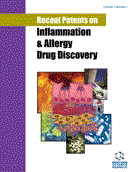Abstract
The prevalence of food allergy and anaphylaxis in children is reported to be increasing in recent years. Evidence suggests that exposure to large doses of antigen might produce a suppression of the specific IgE response, so that the continuous contact with high doses of antigens favours the maintenance of tolerance In the same way loss of contact with allergen in children with specific IgE reactivity may favour a loss of tolerance with development of systemic reactions, while a progressive new contact with allergen may favour a specific tolerance induction. We hypothesize that widespread and uncontrolled use of elimination diets for atopic dermatitis may have played a role in the increase of allergy and anaphylaxis. Specific oral tolerance induction may be a possible therapeutic strategy. The article review food allergies caused by exclusion diet and also discuss recent patents related to the field.
Keywords: Food allergy, exclusion diet, specific oral tolerance induction, immunological risk
 5
5


















